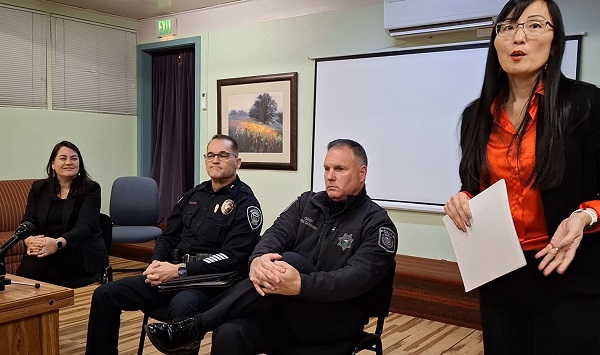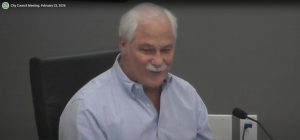Eugene police chief apologizes to local Asian American community
8 min read
Presenter: A sophisticated burglary ring has been targeting Asian Americans nationwide, but nobody shared that information with potential targets here in Eugene and Springfield. So far there have been two waves of burglaries, thirteen in all, with one residence targeted three times. At a community meeting Jan. 16, multiple apologies from Eugene Police Chief Chris Skinner:
Chris Skinner (Eugene Police, chief): The piece that we missed was that piece where we are connected through SIU with somebody from the Asian American community and just made that phone call, that text message, that email saying, ‘Hey, we’re on it. We’re on it and this is what we’re seeing, this is what we need you to share with your folks as we continue to do our job.’ We missed that part.
[00:00:41] Jensina Hawkins (Event co-organizer): Chief Skinner, please define SIU.
[00:00:44] Chris Skinner: I’m sorry, Special Investigation Unit. It’s a special part of our organization that does all of our intelligence gathering. They’re the ones that are monitoring hate groups. They’re the ones that are monitoring and embedded in different social media platforms to kind of see what’s going on in our community, negative and violent activism in our community.
And so they’re also the ones that will do some of the more complex hate and bias investigations. So they’re the ones that are the liaison, that have the connection with the different groups. And so we could have brought them into this conversation as Property Crimes (detectives) deal with the burglaries and had that piece of communication in the backend. And that’s just a swing and a miss by the Eugene Police Department and a lesson learned..
We should have connected with this group much more privately, sharing what was going on as opposed to airing this out in the general public media.
[00:01:36] Presenter: Unfortunately, the SIU does not have a relationship with the Asian American community at this time. Jensina Hawkins welcomes David Tam.
[00:01:45] Jensina Hawkins: David, did you have a question?
[00:01:46] David Tam (Asian American Council of Oregon, event sponsor): Yeah, so first I would say that my comments are my own. I am the president of the Asian (American) Council… My first comment is saying thank you for all that EPD and that SPD does for the community. I do know it’s not an easy job. I am not here to blame anyone for anything. I’m here to learn how to collaborate…
For history’s sake, I have worked with the EPD in Eugene for many, many years … I do not know who the new SIU contact is with the AAPI (Asian American Pacific Islander) community. I didn’t know if there was ever a designated person for that and I think it would be important for us to have a sit-down conversation with them just to be able to get to know them and for them to get to know us. (For sure.)
[00:02:28] Presenter: The city’s Office of Equity and Community Engagement was also asked to help. Jensina Hawkins:
[00:02:34] Jensina Hawkins: I will say that one of my first emails was to the city’s Office of Equity and Community Engagement, and the reply that I received is that it’s in the hands of EPD.
[00:02:42] Presenter: NAACP Executive Director Drae Charles:
[00:02:45] Drae Charles (NAACP, event sponsor): So historically what the city has done is lean into its Office of Equity and Community Engagement. That office in its current state has burnt a lot of community bridges. So the community at large is not confident in that office’s work and that office’s leadership. And so they don’t engage with that space as often as they used to. And so it’s left a lot of folks in isolation, both internally and externally.
[00:03:11] Presenter: The Office of Equity and Community Engagement did not engage with the community, leaving the Eugene Police chief to apologize repeatedly throughout the meeting. Referencing the number of burglaries, Jensina Hawkins:
[00:03:23] Jensina Hawkins: Thirteen (burglaries) feels like a lot of touch points.
[00:03:26] Chris Skinner: Well, like, I’m not sure how many times I can apologize for that. You’re right, 13 touch points is a lot. We should have done something there. There’s no question about that.
[00:03:35] Presenter: Chief Skinner shared intelligence about the burglaries.
[00:03:38] Chris Skinner: We’ve been in this space looking at these crimes for about a year now, it feels like, with a couple of different waves of burglaries that have happened that have targeted Asian American homes.
One of the commonalities that we’ve seen here: The amount of research and effort and planning that went into these burglaries is significant. This is not a smash-and-grab crime of opportunity that we see in many of our other crimes. This is a very calculated, very well researched, very intentional set of crimes that have occurred.
Criminals are taking the time and the care to identify those individuals and/or families that they believe to be affluent and have done their research to be able to have some targeted burglaries.
The one commonality, regardless of your business, is whether or not you are perceived as being a successful business. And we’re seeing that nationwide where people are in these smaller communities trying to identify what they perceive to be a successful business, and I don’t know what that means to them, like, from a bad guy’s perspective, I don’t know what that means, what success means for them.
I do think that (and this is just my sense) is that I do think there’s some racial profiling here that extends to the Asian American community, to include our East Indian part of that community, that there is a higher propensity to keep jewelry and cash at home.
And I think that’s the perception that they’ve held, that make it more attractive to target your home than to target your business.
[00:05:21] Presenter: Councilor Randy Groves:
[00:05:22] Councilor Randy Groves: Are there resources available in your respective agencies to help with vulnerability assessments, where they actually look at where your risk is, right?
[00:05:35] Presenter: Chief Skinner:
[00:05:35] Chris Skinner: The Eugene Police Department has a group called the Community Engagement Team. That group is very skilled to be able to come out and actually do an onsite assessment, crime prevention through environmental design, make those recommendations, help, and in many ways point you to the resources where you can get the right answers if we don’t have those.
So yeah, Councilor Groves, I appreciate that. We do have a group that this is what they do for our community, for both businesses and residential, so it doesn’t matter what it is, we have a resource for it. Cherie Nelson is our supervisor of CET and what’s easiest is you can either email her, which is a super easy email, you can certainly connect with me and I can pass that along.
[00:06:20] Presenter: Mayor Kaarin Knudson:
[00:06:21] Kaarin Knudson (Eugene mayor): A lot of effort goes into really great public education campaigns and information-sharing. Is there a best practice and a sort of simple one-pager that can be shared on that target hardening piece of this puzzle? And then is there also information about what to do after (a burglary).
[00:06:38] Presenter: Chief Skinner:
[00:06:39] Chris Skinner: Yes, so two parts to that. First part is yes, we do a lot of outreach around crime prevention tips. I mean, you’ll see us, depending on the time of the year, you’ll see us do stuff in the beginning of school year, during Halloween with kids out trick-or-treating, and we actually put out after that first wave of burglaries put out a press release with some of that to include not calling out the Asian American community but calling out individuals who have a high tendency to keep jewelry and money at home, hoping people would recognize themselves as such and think about that. So, yeah, we have a good mechanism to do the crime prevention outreach stuff that we want to do.
The victim care or the victim-centered approach to what we do is a little bit more nuanced for us. And I don’t know if we have victims in this room or not, but I’d be interested if we did, how that felt as you navigated that process. So what we hope happens and what I thought I heard was communicated to me by my detective division is that we were very, very closely connected with victims to get just one-on-one with the victims, making sure that they were either kept in the loop or communicated with or understood what next steps with.
So some of that victim-centered approach happens very quietly behind the scenes between an investigator and a victim and not openly communicated and broadly communicated with people. Not saying we’re always great at victim care or we don’t always have a great victim-centered approach to things we do. But that’s what we want to strive to do, is understand that it’s a really, really emotional event for somebody and really certain on how the path is going to be post-criminal activity, that we stay connected to that victim.
[00:08:14] Presenter: He also recommended neighborhood associations. Eugene Police Chief Chris Skinner:
[00:08:19] Chris Skinner: A neighborhood watch is almost nonexistent here, but what is existent is some really organized neighborhood associations, very organized neighborhood associations, around geography, and it’s much more broader than just a neighborhood, it’s pretty good-sized geography.
Very well organized, very well connected, good communicators. We hear from them a lot and we have good relationships with them. So getting engaged with your neighborhood association can be very, very much in alignment with what you would perceive as also a Neighborhood Watch-type of organization.
[00:08:51] Presenter: Jensina Hawkins:
[00:08:52] Jensina Hawkins: Have you found dogs to be—
[00:08:54] Chris Skinner: 100%.
[00:08:55] Jensina Hawkins: OK, so effective.
[00:08:57] Chris Skinner: 100 %—dogs are actually one of the first things that burglars look for.
[00:09:00] Jensina Hawkins: Mr. Hawkins, we’re getting a dog.
[00:09:04] Chris Skinner: Honestly, dogs, and if they’re like my dog is, he thinks he’s a big dog, he’s not, but he’s loud, right. I always know when somebody’s on my front door. But that is actually one of the things that is part of the (burglars’) scouting mission: Cameras and dogs, interestingly enough…
If I could take a moment and give us a plug as a group, one of the things that we lack in the Eugene-Springfield area is we have not been great about leveraging technology to help us do our jobs better.
The presence of LPR technology, which is License Plate Reader technology, in fixed locations that help us identify suspect vehicles that we know we’re looking for and the pattern of suspect vehicles in our community—this area is sorely behind, from a technological perspective, on helping us do our job.
[00:10:02] Presenter: Eugene City Councilor Jennifer Yeh:
[00:10:04] Councilor Jennifer Yeh: I just wanted to thank Jensina. As you all know, she serves on our Police Commission, and she has been an invaluable voice for the larger Asian American community and she has done events like this because of her seat there and hearing things about the community. And we are looking for more members. This is a great time to get involved and it really does make a difference to have a diverse group of people at the table.
[00:10:28] Presenter: With Eugene’s mayor, two councilors, and two 4J school board members attending, local police chiefs apologize after multiple departments miss an opportunity to support the Asian American community.
Image: Event organizer and 4J School Board Member Jenny Jonak, Springfield Police Chief Andy Shearer, and Eugene Police Chief Chris Skinner listen to event organizer Jensina Hawkins welcoming the community to the Jan. 16, 2025 public information meeting.




